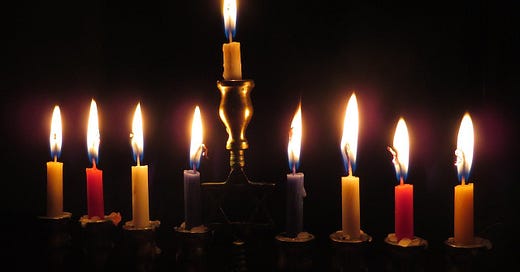The nature of the miracle we celebrate on Hanukkah has long been a topic of discussion, perhaps as much as the “correct” English spelling of the holiday. People can’t seem to get enough of debating the “true” meaning of Hanukkah. There is not one authoritative answer to this question. In various rabbinic sources, we see an emphasis on the place of fire and oil in Hanukkah. Others, including Jews during the Crusades who composed Maoz Tzur and later Zionist thinkers, emphasized the miracle of the military victory of the Hasmoneans. Recently, as part of the attempt to highlight marginalized voices from throughout Jewish history, the story of Judith--a brave woman who decapitated Holofernes and helped defeat the Assyrians--has come back into focus. Last year, Rabbi Aryeh Cohen wrote an excellent piece arguing that Hanukkah is really about Jewish space, presence, and diaspora.
While it is easy to view defining the essence of Hanukkah differently depending on contemporary experiences as a politically motivated attempt to repackage Jewish history, engaging in this meaning making might be precisely what the holiday is about.1 In fact, one of the main questions the Talmud asks about the holiday of Hanukkah is “מאי חנוכה,” “What is Hanukkah?” Asking the question “What is Hanukkah?” is as central to our celebration of the holiday as lighting the menorah, or as telling the story of the Hasmonean victory.
How we remember is perhaps just as important as what we remember. This September, author Melissa Fay Greene penned an article in The Atlantic titled “You Won’t Remember the Pandemic the Way You Think You Will.” She explains that how we remember things is shaped by both our experiences and the experiences of those around us. What most interested me about this piece was Greene’s attention to how the ways in which we remember the past informs our present. “People whose narratives [of their life] include a lot of redemptive arcs tend to have a higher psychological well-being,” she writes. Not only is it natural that we choose how to remember the past, it is also a tool of resilience.
Hanukkah is just one of many Jewish holidays where we as Jews remember the past. From Pesach--where we tell our children we, yes we, were slaves in Egypt--to Tisha B’Av--a compilation of Jewish grief, memory is central to Judaism. Yet not all commemoration is created equal. On Tisha B’Av, for example, we sit in our pain. There is an important place for this. However on Hanukkah, our trials and tribulations are not the end of the story; whether you focus on the Maccabees, the oil, or something else entirely, your story ends with redemption.
Getting to a place of redemption is often easier said than done. If you’re reading this at a particularly painful moment in your life, it might be hard to see past the darkness. I would be naive to say things always get better. So, I’m not going to say that. But here’s what I will say: Redemption may not always be linear, but history does have an interesting way of circling back on itself… We commemorate Hanukkah beginning on the 25th of Kislev, the date that the temple was rededicated. This is also the date the temple is said to have been defiled.2 Not so coincidentally, it is also around the darkest time of the year. In marking Hanukkah on this day, at this time, we choose to remain open to the possibility that our moments of despair are not the end of the story. For those of us looking back on the past few months or years and struggling to find a redemption arc to remember, Hanukkah is a reminder that redemption could still arrive. Sometimes, we need that glimmer of hope.
What is Hanukkah? It is a quintessential Jewish redemption arc. The details and timeline of that redemption arc depend on where you’re standing. This year, what will your answer to the question “מאי חנוכה” be? What story do you need to tell yourself this year? If we can learn how to make meaning of the Hanukkah story, to find light in dark times, perhaps we can make meaning of our own stories, too.
Thank you to my friends at jewschool, who are also sharing this piece.
This is not to say that all historical readings are equally accurate or that there are no ethical implications of how one chooses to read history...on the contrary!
II Maccabees 10:5; cf. I Maccabees 4:52-54



